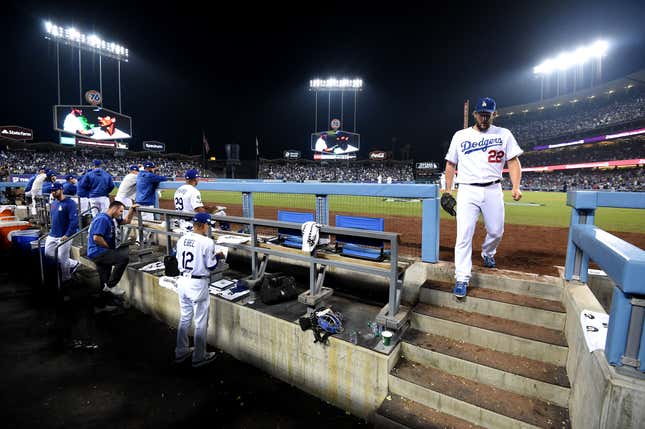
Clayton Kershaw was on in the eighth for two batters, and two batters only, no matter how he looked, no matter the result. Kenta Maeda was warm and ready, and after Kershaw faced Anthony Rendon and Juan Soto, Maeda would come in for a string of righties. So, just two batters, with a two-run lead. Kershaw threw them three pitches, and two of them left the park, and the greatest pitcher of his generation had come apart in the playoffs yet again. And he left, to boos.
The game was merely tied after the back-to-back homers, but that, spiritually at the time and factually two innings later, was that. “Everything people say is true right now about the postseason,” Kershaw said.
How can this keep happening? How can Clayton Kershaw, who even if he is no longer quite Clayton Kershaw is still Clayton Kershaw, keep going to pieces in October? Could it just be some Powerball-odds-level run of bad luck, with no greater cause? After all, every pitcher has bad days, and maybe one of them just happens to have his bad days in fall after fall. Or could it be something genuinely pathological but eminently understandable, a weakness for pressure? That doesn’t make a ton of sense, given that pitching is by definition a pressure situation and Kershaw’s one of the best ever to take the mound in this sport’s history, but logic clearly has very little to do with it. Or maybe it—the streak, the curse, the choke, whatever—is its own cause: Maybe some early-career fluky blow-ups led Kershaw to be hyperaware of his own postseason performance and overcompensate, overthink, overthrow, a sort of autumnal yips.
Kershaw had no answers after the game, because if there were answers there’d be a solution, and if there were a solution he would have found it by now, and if he’d found the solution there’d be no more questions to which he didn’t have answers. Instead he was existentially bereft, openly wondering if he’d ever get over this—“this” being the latest collapse but also, everything.
“I’ve had to do it so much,” Kershaw said. “I don’t know. It might linger for a while. I might not get over it. I don’t know.”
The blame doesn’t fall solely or even mostly on Kershaw. This is on Dave Roberts, guilty of perhaps managing with his heart instead of his head; even without Kershaw’s postseason struggles looming over everything, Roberts had better relievers and better matchups he could and should have turned to. Kershaw, these days, at age 31, is out of gas. He’s a crafty lefty™ now, but he struggles to break 90 MPH, and his fastball doesn’t outpace his breaking pitches, so if he doesn’t hit his spots, he’s serving up meatballs. That’s the last thing the Dodgers could afford in a Game 5, against two power hitters. (Rendon went down to get an 89 MPH fastball; Soto gorged on an 89 MPH slider that didn’t slide.)
Here’s Roberts’s explanation if you want it, and if you can parse it:
“I felt good about Clayton right there. Eaton, and when you got Rendon and Soto, so I felt that I liked Clayton. He threw, I don’t know what it was, a couple pitches, and we had Clayton ready for whatever today. So for Maeda to go through Soto, Kenta in this role, we really liked him against the right-hander. And the success that Clayton’s had against Soto with the two-run lead, I’ll take Clayton any day in that situation. I just think it’s one of those where it was easy for me to get Clayton, with the low pitches to get Rendon and to go out there and get Soto. And to have Kenta behind him. That was my thought, and not have Kenta go through Soto.”
Kershaw’s overall decline muddies the waters a little bit here; he just doesn’t have the stuff to be automatically called upon in a situation like Wednesday’s. There is, dispassionately, no need to invoke his postseason history to explain what happened. Yet we will, because Kershaw does, and because his teammates do and know he does and react accordingly. His rookie catcher hugged him and told him how much he admired him. “I love you,” his pitching coach told him. “You always give everything you’ve got. Sometimes it don’t work out.” And there, Kershaw burst into tears.
It was impossible not to contemplate each time TBS cut to its pathos-cam: What if this is it?
Just because the Dodgers have made the last seven postseasons, there’s no guarantee they’ll make the next. What if we’re deprived of that elusive, probably nonexistent piece of evidence that could help explain why Kershaw consistently loses his cool when the weather takes on a chill. What if the Dodgers never get a shot at redemption, what if we never get an answer, and what if Kershaw never gets either? That’s the joyful, brutal, exquisitely unsatisfying thing about baseball: There’s no sense in trying to make sense of it.